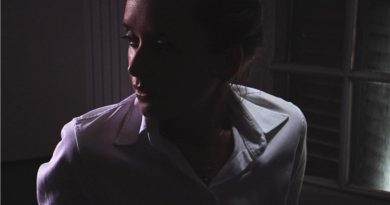Buttercup Bill (18) | Close-Up Film Review
Dir. Émilie Richard-Froozan and Rémy Bennett, US, 2014, 96 mins
Cast: Rémy Bennett, Evan Louison
Buttercup Bill largely plays out as a reimagining of life itself – what if you could have anything you’ve ever wanted in your life?
Described as a dark psychosexual romance, Richard-Froozan and Bennett’s 2014 conception is a surreal, fiercely imaginative film that explores the repressed, lingering childhood feelings of its two central characters. Buttercup Bill’s focus revolves solidly around the tentative romance between Patrick (Evan Louison) and Pernilla (Rémy Bennett, also the film’s director) as they attempt to reconnect with one another after the death of a childhood friend.
As both fiercely cling onto a shared childhood’s secrets, throughout they appear more like brother and sister than best friends or lovers. Closer then many twins, their subversive quasi-sexual relationship involves a series of lurid, awkward sexual games of jealousy that mainstay a relationship which seems only to exist as an attempt to escape from the harsh realities of life, both present and past.
Opening with death, the overriding feeling throughout Buttercup Bill is the feeling of longing; ‘do you ever just want to go back?’ Jumping back and forth between flashback and the present day, soon their lost innocence is replaced by feelings of despair and angst as the audience truly begins to navigate what the game of Buttercup Bill represents in a plot filled with melancholic non-linear sequences.
Endlessly running from their immediate environments, garish neon landscapes flash by in a blur as Pernilla begins what appears to be her grieving process, causing audiences to be rather unexpectedly transported to a lush, dense setting so opposed to the traditional cityscape, as feelings of salvation and forgiveness become the overriding concern with the film. As religious iconography and tales of treachery are brought to the surface, each character seemingly goes through some sort of transformative experience as the truest representation of Patrick and Pernilla’s depravity is finally realised on screen in an all-or-nothing scenario.
Turning full circle, the sense of confusion and disillusionment felt by the film’s central characters is only mutually recognised in audiences in the moments in dissecting the childhood game of Buttercup Bill, which perhaps represents the most damning secret of them all. Then, as feelings from the past and present begin to become increasingly entangled, their parasitic symbiotic relationship begins to implode, as Pernilla’s emotional loss of Patrick seems to be a step too far for the couple to recover from. No longer are they on the same level, physically or emotionally.
It is better to feel the intensity within Buttercup Bill then attempt to understand the entirety of the film and all of its nuances. In a film filled with longing and loss which is deposited in each sequence, essentially what we are watching is a pair of grown-up children trying to reconnect in the harshness of the world that has so furiously torn them apart. Perhaps then the film’s numerous flashbacks are a form of therapy for the characters in an attempt at self-healing as they regress to a time when everything seemed all the more simple. In the case of Buttercup Bill, ‘childhood is the kingdom where nobody dies’ (Edna St. Vincent Millay, 1937).
Review by Rayvenn Shaleigha D’Clark
[SRA value=”3″ type=”BIG”]


